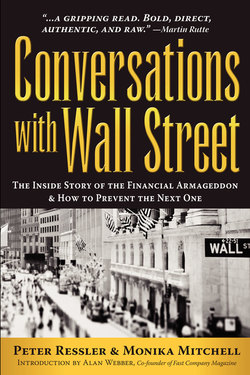Читать книгу Conversations With Wall Street - Peter Ressler - Страница 9
На сайте Литреса книга снята с продажи.
Early Days at Lehman
ОглавлениеLehman Brothers was looking for a government bond salesman, and the hiring manager was a guy called Fast Eddie. The first time I met him, he was on the trading floor. A Robert Redford clone, Eddie had one phone on each ear while he was talking with three people on the desk. As I sat in the seat next to him, I could not believe how many things he had going on at the same time. In between these conversations, he would look at me and say in rapid fire, “Find me a govie sales guy who covers the top insurance companies, money managers and pension funds.” Then he would go back to his other conversations and in between blurt out, “Make sure he is comfortable with the long end of the curve.” He went back to the phones, then shouted, “Options, he has to know the options market.” Someone whispered in his ear, and he got up and raced into one of the glass offices surrounding the trading floor. I could see him involved in an animated conversation with three other people in the office. When he came back to the desk, he started to say something to me but got interrupted by a phone call. As I waited, he put his hand over the receiver and said, “Thanks for coming in, kid. I’m gonna be a while,” and walked away. I got up to shake his hand and say goodbye, but he did not look up as he left the floor. The whole meeting lasted twenty minutes.
The trading floor was a massive sea of white shirts that stretched as far as the eye could see. Hundreds of guys with phones plastered to their ears stood, shouting bids and offers at a frenetic pace. This was the most intense work environment I had ever seen. There was so much energy in the room you could cut it with a knife. The pace and excitement were immediately attractive to me. You either loved it or hated it—and I loved it. In those days Lehman Brothers was lean, mean and looking to build its trading prowess. It was like an underfed teenager with a giant appetite, as it gobbled up all the talent it could find. I helped the firm build the trading desk through the eighties and mid-nineties under the benevolent tutelage of magnanimous men like Tom Tucker, the former head of fixed income sales, and Lehman Brothers president Chris Petit. In those days, Lehman operated under the modus operandi of “My Word is My Bond.” We completed deals with a handshake or over the phone; no one ever backed out of an agreement or went back on their word. Customers came first and honor was the code. Under Tom and Chris, Lehman created an ethic of trust in an industry that idolized the celluloid indifference of Gordon Gekko. Their example taught me that integrity mattered. Chris Petit and Tom Tucker were childhood friends and created an environment of camaraderie. The C-Suite was called “the Living Room” because Petit wanted employees to feel as comfortable there as they did at home. Little did they know that their own Gordon Gekko was in their midst in the form of future president Joe Gregory. Joe would unseat them both in the years to come and change the foundation of trust and community to one of subterfuge and intrigue. But in 1984, we were all naïve and happy to be where we were. Life was good and the future looked bright.
